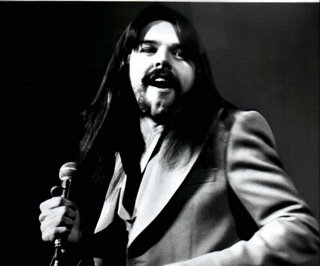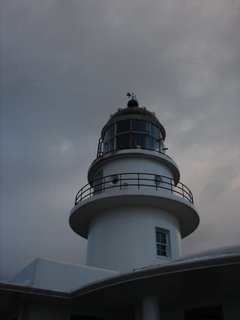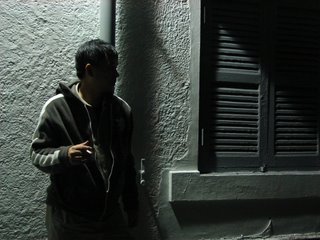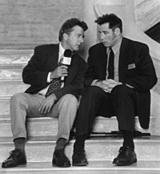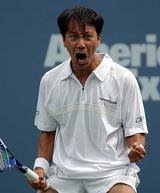WHERE'S TAIWAN? I WILL SHOW YOU
Below is a promotional film produced by Taiwan, in which Chien-Ming Wang, NYY Bronx Bomber new prospect pitcher, sat in the back seat of a New York taxi cab having a conversation with the taxi driver.
Driver: Like Baseball?
Wang: Yeah!
Drive: Where're you from?
Wang: Taiwan.
Driver: Taiwan? (Chuckle) You wanna tell me where's Taiwan?
Wang: I will show you.
Wang did it.
During the FOX broadcast of the Yankees and Tigers on last Tuesday when Wang earned his first playoff win, a map of Taiwan popped up on screen accompanied with an introduction to the country (the same map came up screen again several days later for LA Dodgers starter Hong-Chih Kuo, another Taiwan-native MLB pitcher). Despite the 19-game winner Wang's incredible performance in this season draws share of critics and skeptics, his success has turned the 23 million people in this island all Yankee fans. Interestingly, there's a Chinese sports daily calling Wang a "Chinese pitcher" in its coverage title in August, leading to a huge protest from people of Taiwan, who acclaim Wang as the "Son of Taiwan".
So what's the difference between Taiwan and China?
Let's go back to the game on Tuesday, the Fox reporters had called Taiwan, the country where Chien-ming Wang comes from, for dozens of times – no China, or Republic of China, or Chinese Taipei, or anything about China. What's the big deal? Most people all over the world including U.S. official spokespersons call us, straightly, Taiwan. Ridiculously, when Taiwan President Chen suggested early this year that the country should consider applying for United Nations membership under the name of Taiwan if the official national title "Republic of China" cannot be used, guess what the U.S. reaction is? Deputy U.S. State Department Spokesman Adam Ereli harshly criticized that Taiwan's participation in the U.N. under the name of Taiwan would violate the U.S. policy against "unilateral change to the status quo".
What means Taiwan's "status quo"? One China, if we follow Ereli's argument? Definitely not.
A friend from Chile told me that when he applied visa to Taiwan through the Chinese embassy in Santiago, only to be rejected with the taunt, "You should go to Taiwan's embassy," a Chinese officer said. My Chilean friend was quite puzzled then: doesn't China always claim that Taiwan is a part of its territory? Actually Chinese government has never had its sovereignty over the island for any minute; nor have Taiwanese people ever paid any tax to China. That's the so-called status quo.
More absurdly, the diplomatic rhetoric (The United States does not support Taiwan independence and opposes unilateral change to the status quo by either Taiwan or Beijing. We support dialogue in the interest of achieving a peaceful resolution of cross-Strait differences in a manner that is acceptable to the people on both sides of the Taiwan Strait...) was repeated, warning Taiwan would cross the red line of Washington, as President Chen announced to revise the constitution next year. Do you guys know the "official definition" of the national territory set forth in the Taiwanese Constitution made in China in 1936 still so far includes the mainland China and Mongolia? Chen did the revision just to reflect Taiwan's current status and reaffirm Taiwan's commitment to the status quo (i.e. no more reconquering Mainalnd China). It is Ereli's statement that contradicts the U.S. policy.
Everybody calls us Taiwan but, on many occasions, we are forbidden to call ourselves Taiwan. Especially in Olympic Games we are given a weird name "Chinese Taipei". What's more incredible is that Kaohsiung, the second largest in Taiwan, will host the World Games in 2009 and the World University Games in 2011 in the name of Chinese Taipei. However, Kaohsiung is not subordinate to Taipei; it is a metropolis 400km away from Taipei and has its own elected mayor. Calling Kaohsiung "Taipei" would be as foolish as calling Baltimore "New York". On the Internet we also see so may self righteous websites involved in such a kind of stupid political bias. A few weeks ago my computer was unfortunately kidnapped by a malicious spy software named Bravesentry. I went to find a removal program, which would charge me around USD30, and just followed its download instructions to restore my PC as soon as possible. I registered my personal data and rolled down the country menu to select mine, but I was mush upset to find the option "Taiwan – A Province of China" there. I shut off the register window right away. Do we Taiwanese people deserve that rude and unfair treatment? Or can we call you "the US – a former colony of British"? I aborted the solution and soon found another one, which would not force me to admit that Taiwan is a part of China, from Bleepingcomputer to remove the virus, and it was free and didn't take any dime from me!
All American officers or commercial website owners know the truth that Taiwan is de facto already an independent state, but why can't they just say it right from their mouth? Businessmen crave profits in the emerging Chinese market and avoid irritating the Chinese government with the controversial political issue. That's comprehensible. But why can't U.S. officers? There was an episode in "The West Wing" on December 1, 2004, which might answer the question.
"We got a question... about a flag the President received this morning at the National Prayer Breakfast." says Carol (starring Melissa Fitzgerald, Assistant to the Press Secretary).
"A flag?" Josh (starring Bradley Whiteford, as Deputy Chief of Staff) asks her.
"A green flag from the Taiwanese delegation.... green with a red flower."
"...No, no, no-no, no.... The Chinese are going to freak out.... The green flag is the original flag of the Taiwan independence movement.... You can see why I might be mildly concerned about the symbolism of the President accepting their flag on the eve of a major summit with China..."
The Chinese are going to freak out? Why did a Taiwanese flag make the White House staff answer so hysterically? What they were scared of is, simply put, war. War? It could be the last thing the U.S. government fears. In some dimensions America is regarded as a militant dictatorship. You'll never challenge my view once you look at what Americans have done to Middle East, Latin America, and Africa where they sent soliders to uphold democracy, freedom, human rights and justice, or what action they are going to take against North Korea over its recent nuclear test. The U.S. always considers itself the world's cop and likes to do so. Yet this is in no way true when the States are facing Chinese roguery; they do nothing but appease the awakening lion. In early 2005 China enacted the Anti-Session Law, which clearly commits the Beijing authority to using non-peaceful means against Taiwan. It was evidently a fundamental break with the status quo that has existed for decades across the strait of Taiwan, but we didn't see any severe response from the U.S. State Department, not to mention the US attitude toward China's deployment of nearly a thousand of guided missiles targeting Taiwan.
The dread of war with China makes the US acknowledgement of universal value rather selective. When 911 happened (Pardon me. I didn't mean to remind anybody of any awful memory), many Chinese people hilariously gathered on the street celebrating the attack or showed on cyber space praising Osama Bin Laden (if you read Chinese, you may find how Chinese were laughing at the tragic accident from the forum). It's clear which side that Chinese stand on. Unexpectedly the U.S. government turned to ask for China's support of anti-terrorism. No wonder Washington just keeps complaining Chen's administration for the pending NT600 billion military purchase from the US while ignoring the "pan-blue" coalition that blocks the purchase proposal to echo Beijing's claim. That's why Mr. Lee Teng-hui, former President of Taiwan, always sighs, "How sad to be a Taiwanese!"
View Chinese Version (中文版)
Driver: Like Baseball?
Wang: Yeah!
Drive: Where're you from?
Wang: Taiwan.
Driver: Taiwan? (Chuckle) You wanna tell me where's Taiwan?
Wang: I will show you.
Wang did it.
During the FOX broadcast of the Yankees and Tigers on last Tuesday when Wang earned his first playoff win, a map of Taiwan popped up on screen accompanied with an introduction to the country (the same map came up screen again several days later for LA Dodgers starter Hong-Chih Kuo, another Taiwan-native MLB pitcher). Despite the 19-game winner Wang's incredible performance in this season draws share of critics and skeptics, his success has turned the 23 million people in this island all Yankee fans. Interestingly, there's a Chinese sports daily calling Wang a "Chinese pitcher" in its coverage title in August, leading to a huge protest from people of Taiwan, who acclaim Wang as the "Son of Taiwan".
So what's the difference between Taiwan and China?
Let's go back to the game on Tuesday, the Fox reporters had called Taiwan, the country where Chien-ming Wang comes from, for dozens of times – no China, or Republic of China, or Chinese Taipei, or anything about China. What's the big deal? Most people all over the world including U.S. official spokespersons call us, straightly, Taiwan. Ridiculously, when Taiwan President Chen suggested early this year that the country should consider applying for United Nations membership under the name of Taiwan if the official national title "Republic of China" cannot be used, guess what the U.S. reaction is? Deputy U.S. State Department Spokesman Adam Ereli harshly criticized that Taiwan's participation in the U.N. under the name of Taiwan would violate the U.S. policy against "unilateral change to the status quo".
What means Taiwan's "status quo"? One China, if we follow Ereli's argument? Definitely not.
A friend from Chile told me that when he applied visa to Taiwan through the Chinese embassy in Santiago, only to be rejected with the taunt, "You should go to Taiwan's embassy," a Chinese officer said. My Chilean friend was quite puzzled then: doesn't China always claim that Taiwan is a part of its territory? Actually Chinese government has never had its sovereignty over the island for any minute; nor have Taiwanese people ever paid any tax to China. That's the so-called status quo.
More absurdly, the diplomatic rhetoric (The United States does not support Taiwan independence and opposes unilateral change to the status quo by either Taiwan or Beijing. We support dialogue in the interest of achieving a peaceful resolution of cross-Strait differences in a manner that is acceptable to the people on both sides of the Taiwan Strait...) was repeated, warning Taiwan would cross the red line of Washington, as President Chen announced to revise the constitution next year. Do you guys know the "official definition" of the national territory set forth in the Taiwanese Constitution made in China in 1936 still so far includes the mainland China and Mongolia? Chen did the revision just to reflect Taiwan's current status and reaffirm Taiwan's commitment to the status quo (i.e. no more reconquering Mainalnd China). It is Ereli's statement that contradicts the U.S. policy.
Everybody calls us Taiwan but, on many occasions, we are forbidden to call ourselves Taiwan. Especially in Olympic Games we are given a weird name "Chinese Taipei". What's more incredible is that Kaohsiung, the second largest in Taiwan, will host the World Games in 2009 and the World University Games in 2011 in the name of Chinese Taipei. However, Kaohsiung is not subordinate to Taipei; it is a metropolis 400km away from Taipei and has its own elected mayor. Calling Kaohsiung "Taipei" would be as foolish as calling Baltimore "New York". On the Internet we also see so may self righteous websites involved in such a kind of stupid political bias. A few weeks ago my computer was unfortunately kidnapped by a malicious spy software named Bravesentry. I went to find a removal program, which would charge me around USD30, and just followed its download instructions to restore my PC as soon as possible. I registered my personal data and rolled down the country menu to select mine, but I was mush upset to find the option "Taiwan – A Province of China" there. I shut off the register window right away. Do we Taiwanese people deserve that rude and unfair treatment? Or can we call you "the US – a former colony of British"? I aborted the solution and soon found another one, which would not force me to admit that Taiwan is a part of China, from Bleepingcomputer to remove the virus, and it was free and didn't take any dime from me!
All American officers or commercial website owners know the truth that Taiwan is de facto already an independent state, but why can't they just say it right from their mouth? Businessmen crave profits in the emerging Chinese market and avoid irritating the Chinese government with the controversial political issue. That's comprehensible. But why can't U.S. officers? There was an episode in "The West Wing" on December 1, 2004, which might answer the question.
"We got a question... about a flag the President received this morning at the National Prayer Breakfast." says Carol (starring Melissa Fitzgerald, Assistant to the Press Secretary).
"A flag?" Josh (starring Bradley Whiteford, as Deputy Chief of Staff) asks her.
"A green flag from the Taiwanese delegation.... green with a red flower."
"...No, no, no-no, no.... The Chinese are going to freak out.... The green flag is the original flag of the Taiwan independence movement.... You can see why I might be mildly concerned about the symbolism of the President accepting their flag on the eve of a major summit with China..."
The Chinese are going to freak out? Why did a Taiwanese flag make the White House staff answer so hysterically? What they were scared of is, simply put, war. War? It could be the last thing the U.S. government fears. In some dimensions America is regarded as a militant dictatorship. You'll never challenge my view once you look at what Americans have done to Middle East, Latin America, and Africa where they sent soliders to uphold democracy, freedom, human rights and justice, or what action they are going to take against North Korea over its recent nuclear test. The U.S. always considers itself the world's cop and likes to do so. Yet this is in no way true when the States are facing Chinese roguery; they do nothing but appease the awakening lion. In early 2005 China enacted the Anti-Session Law, which clearly commits the Beijing authority to using non-peaceful means against Taiwan. It was evidently a fundamental break with the status quo that has existed for decades across the strait of Taiwan, but we didn't see any severe response from the U.S. State Department, not to mention the US attitude toward China's deployment of nearly a thousand of guided missiles targeting Taiwan.
The dread of war with China makes the US acknowledgement of universal value rather selective. When 911 happened (Pardon me. I didn't mean to remind anybody of any awful memory), many Chinese people hilariously gathered on the street celebrating the attack or showed on cyber space praising Osama Bin Laden (if you read Chinese, you may find how Chinese were laughing at the tragic accident from the forum). It's clear which side that Chinese stand on. Unexpectedly the U.S. government turned to ask for China's support of anti-terrorism. No wonder Washington just keeps complaining Chen's administration for the pending NT600 billion military purchase from the US while ignoring the "pan-blue" coalition that blocks the purchase proposal to echo Beijing's claim. That's why Mr. Lee Teng-hui, former President of Taiwan, always sighs, "How sad to be a Taiwanese!"
View Chinese Version (中文版)



